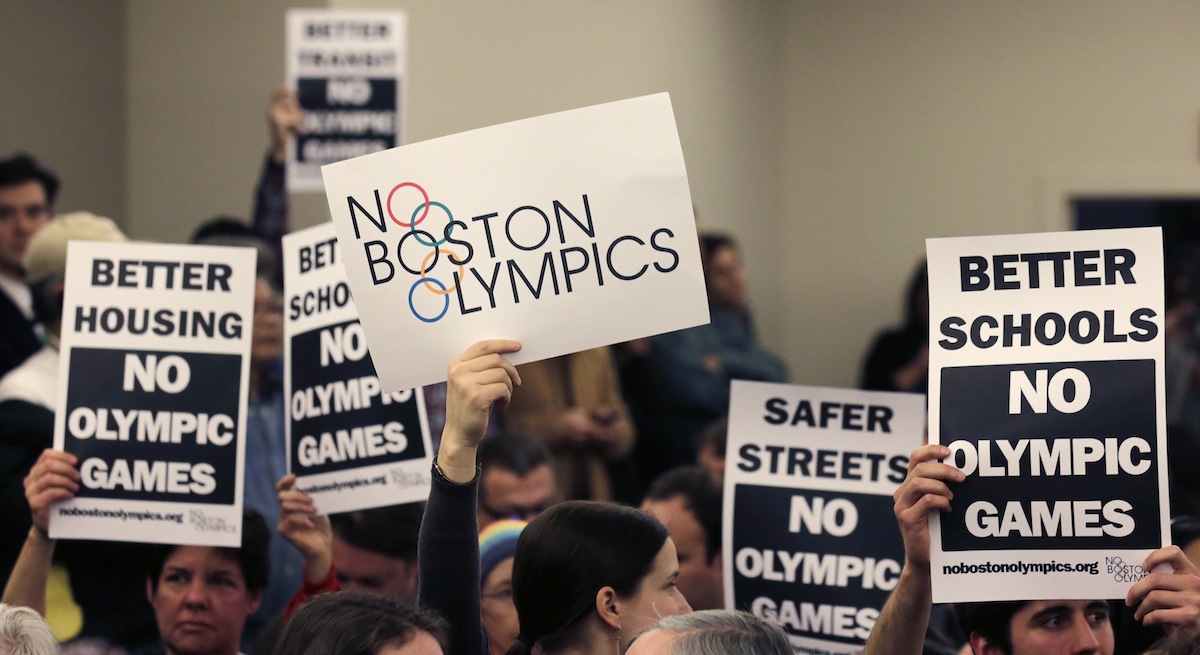For Boston 2024, What Defines ‘Majority Support’ for the Olympics?
In advertisements in Monday’s Globe and Herald, Boston 2024, the group behind the local Olympic Games bid, announced that it wouldn’t move forward unless it had the support of “a majority of people in Massachusetts.” For those who want to see the Olympics come to Boston, staking the future of the bid in the hands of the public is a risky move, but probably a necessary one. The question then, is how one measures that majority support.
Chief among reasons the committee might fear something like a public ballot referendum is that there isn’t currently much support for the games. The latest WBUR poll showed that support has seriously faded in recent months. Just 36 percent of Boston-area respondents said they supported the games. Other cities’ bids have been railroaded by referenda. In a statewide referendum, Colorado voted against hosting the 1976 Winter Games in Denver, so the city abandoned its bid.
But even without a vote, the committee knows it needs to get those numbers up if it stands a chance of hosting the games. The International Olympic Committee will make the final selection, and when it does, it will pay close attention to public support in the potential host cities.
“The IOC takes public support so seriously that it will conduct its own polling in the candidate cities before it selects a host,” the Globe reports. The Boston committee, accused by its adversaries of forcing the bid down the city’s throat in the initial stages, doesn’t want to seem resistant to seeking public input. Given it will need to get that support no matter what, advertising the necessity of winning that majority support makes them look transparent.
That doesn’t mean there won’t be debate over how one measures the public’s willingness to host the games. Determining whether there’s support for the Boston Olympics, it turns out, depends greatly on who and how you ask.
“It’s clear we have to find a measure to show that support,” committee CEO Richard Davey tells the Globe. “How we measure, we’re open to that.”
On Twitter, Steve Koczela, the president of MassINC polling, which conducts WBUR’s polls, pointed out ways Boston 2024 might leave itself “wiggle room” to argue that a referendum of statewide or citywide voters doesn’t reflect the true amount of support for their cause:
Notes on this ad. It says “people” not “voters”. And “Massachusetts” not Boston. pic.twitter.com/2ZqsR3vD2t
— Steve Koczela (@skoczela) March 23, 2015
That’s significant because younger, Minority respondents have shown more willingness to support the games.
— Steve Koczela (@skoczela) March 23, 2015
Also leaves wiggle room out of Olympic referendum results whether Boston or statewide. — Steve Koczela (@skoczela) March 23, 2015
Other groups have already started trying to get a vote on next year’s ballot, but if it comes down to it, the committee may argue that a ballot question doesn’t accurately represent the will of the people. That battle remains a long way off, though. Whether the committee gauges support by referendum or poll or some other means, the fact is, it still has a lot of convincing left to go before it crosses the 50 percent line by any measure.



